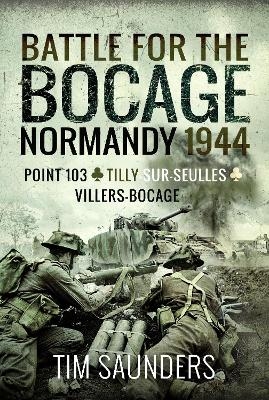
Battle for the Bocage, Normandy 1944
Point 103, Tilly-sur-Seulles and Villers Bocage
Seiten
2023
Pen & Sword Military (Verlag)
978-1-5267-9727-8 (ISBN)
Pen & Sword Military (Verlag)
978-1-5267-9727-8 (ISBN)
The story of the Allies' fight for Point 103, Tilly-sur-Seulles and Vilers Bocage against the elite German Panzer divisions.
This is the story of the fighting in Normandy by the veteran desert formations brought back by Montgomery from the Mediterranean in order to spearhead the invasion; 50th Infantry and 7th Armoured divisions, plus 4th Armoured Brigade. Heavily reinforced by individuals and fresh units, their task beyond the beaches was to push south to Villers Bocage with armour on the evening of D Day in order to disrupt German counter-attacks on the beachhead.
Difficulties on 50th Division’s beaches and lost opportunities allowed time for the 12th Hitlerjugend SS Panzer Division and the equally elite 130th Panzer Lehr Division to arrive in Normandy, despite delays of their own caused by allied fighter bombers. The result was 4th Armoured Brigade’s thrust south encountered opposition from the start and was firmly blocked just south of Point 103 after an advance of less than 5 miles.
A major counter-attack by Panzer Lehr failed, as did a renewed British attempt, this time by the vaunted 7th Armoured Division, which was halted at Tilly sur Seulles. From here the fighting became a progressively attritional struggle in the hedgerows of the Bocage country south of Bayeux. More and more units were drawn into the fighting, which steadily extended west. Finally, an opportunity, via the Caumont Gap, to outflank the German defences was taken and 7th Armoured Division reached Villers Bocage. Here the County of London Yeomanry encountered the newly arrived Tigers of Michael Wittmann, with disastrous results. The Desert Rats were forced to withdraw having lost much of their reputation.
There then followed what the battalions of 50th Division describe as their ‘most unpleasant period of the war’, in bitter fighting, at often very close quarters, for the ‘next hedgerow’.
This is the story of the fighting in Normandy by the veteran desert formations brought back by Montgomery from the Mediterranean in order to spearhead the invasion; 50th Infantry and 7th Armoured divisions, plus 4th Armoured Brigade. Heavily reinforced by individuals and fresh units, their task beyond the beaches was to push south to Villers Bocage with armour on the evening of D Day in order to disrupt German counter-attacks on the beachhead.
Difficulties on 50th Division’s beaches and lost opportunities allowed time for the 12th Hitlerjugend SS Panzer Division and the equally elite 130th Panzer Lehr Division to arrive in Normandy, despite delays of their own caused by allied fighter bombers. The result was 4th Armoured Brigade’s thrust south encountered opposition from the start and was firmly blocked just south of Point 103 after an advance of less than 5 miles.
A major counter-attack by Panzer Lehr failed, as did a renewed British attempt, this time by the vaunted 7th Armoured Division, which was halted at Tilly sur Seulles. From here the fighting became a progressively attritional struggle in the hedgerows of the Bocage country south of Bayeux. More and more units were drawn into the fighting, which steadily extended west. Finally, an opportunity, via the Caumont Gap, to outflank the German defences was taken and 7th Armoured Division reached Villers Bocage. Here the County of London Yeomanry encountered the newly arrived Tigers of Michael Wittmann, with disastrous results. The Desert Rats were forced to withdraw having lost much of their reputation.
There then followed what the battalions of 50th Division describe as their ‘most unpleasant period of the war’, in bitter fighting, at often very close quarters, for the ‘next hedgerow’.
TIM SAUNDERS served as an infantry officer with the British Army for thirty years, during which time he took the opportunity to visit campaigns far and wide, from ancient to modern. Since leaving the Army he has become a full time military historian and has made nearly fifty full documentary films with Battlefield History and Pen & Sword. He is an active guide and accredited member of the Guild of Battlefield Guides.
| Erscheinungsdatum | 01.11.2023 |
|---|---|
| Zusatzinfo | 100 Illustrations |
| Verlagsort | South Yorkshire |
| Sprache | englisch |
| Maße | 156 x 234 mm |
| Themenwelt | Geschichte ► Allgemeine Geschichte ► 1918 bis 1945 |
| Geisteswissenschaften ► Geschichte ► Regional- / Ländergeschichte | |
| Geschichte ► Teilgebiete der Geschichte ► Militärgeschichte | |
| ISBN-10 | 1-5267-9727-5 / 1526797275 |
| ISBN-13 | 978-1-5267-9727-8 / 9781526797278 |
| Zustand | Neuware |
| Haben Sie eine Frage zum Produkt? |
Mehr entdecken
aus dem Bereich
aus dem Bereich
ein Psychologe erlebt das Konzentrationslager
Buch | Hardcover (2024)
Kösel (Verlag)
22,00 €
Mythos „Stauffenberg-Attentat“ – wie der 20. Juli 1944 verklärt und …
Buch | Hardcover (2024)
Goldmann (Verlag)
24,00 €


